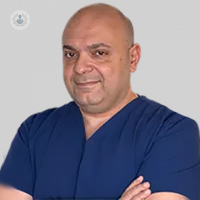Enhance your vision with laser eye surgery
Written in association with:Laser eye surgery is a revolutionary procedure that has transformed the lives of countless individuals seeking to improve their vision. Leading consultant ophthalmologist Mr Ahmad Elsahn explores the intricacies of laser eye surgery, providing you with valuable insights to aid your decision-making process.

Understanding laser eye surgery
Laser eye surgery, also known as refractive surgery, is a procedure designed to correct vision problems such as nearsightedness (myopia), farsightedness (hyperopia), and astigmatism. By reshaping the cornea – the clear, front part of the eye – laser eye surgery can reduce or eliminate the need for glasses or contact lenses.
What are the various types of laser eye surgery?
There are several types of laser eye surgery, each catering to specific vision conditions:
LASIK (Laser-Assisted in Situ Keratomileusis): This is the most common form of laser eye surgery. In LASIK surgery, a thin flap is created on the cornea either by employing a microkeratome or a femtosecond laser surgical instrument. The underlying corneal tissue is then reshaped with an excimer laser to correct the refractive error.
PRK (Photorefractive Keratectomy): PRK involves removing the outer layer of the cornea before reshaping it with an excimer laser. Although the recovery period may be longer compared to LASIK, PRK can be a suitable option for individuals with thin corneas or certain corneal irregularities.
LASEK (Laser Epithelial Keratomileusis): LASEK is a variation of PRK where a thinner layer of the cornea's surface is removed. This technique may be preferred for individuals with thin corneas or those at higher risk of developing dry eyes after surgery.
Is laser eye surgery right for you?
Before undergoing laser eye surgery, it is essential to consult with an experienced ophthalmologist who can assess your suitability for the procedure. Factors such as your eye health, prescription stability, and corneal thickness will be evaluated to determine the most appropriate treatment option for you.
Benefits and considerations
Laser eye surgery offers numerous benefits, including improved vision without the need for glasses or contact lenses, enhanced quality of life, and increased independence. However, it's important to be aware of potential risks and limitations, such as dry eyes, glare, halos, and the possibility of needing retreatment in the future.
Laser eye surgery has revolutionised vision correction, offering a safe and effective solution for many individuals seeking freedom from glasses or contact lenses. By understanding the different types of procedures, consulting with a qualified eye surgeon, and weighing the benefits against the potential risks, you can make an informed decision about whether laser eye surgery is right for you.
If you are considering the benefits of laser eye surgery and would like to book a consultation with Mr Elsahn, do not hesitate to do so by visiting his Top Doctors profile today.


